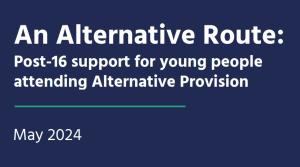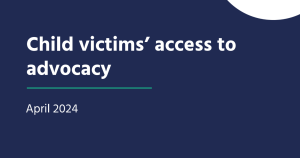Foreword by Dame Rachel de Souza
“People with disabilities are very intelligent in their own way, we all have a voice if it’s by iPad or by mobile phone or eye gaze or a communication book” – Boy, 17, The Big Ask.
This paper is dedicated to all children growing up in England with additional educational needs or disabilities. This is an incredibly varied group: they come from all different communities, are growing up in different circumstances and have a very diverse set of needs.
I want to thank the thousands of children with special educational needs who have shared their experiences with me – their experiences guide every word of this paper. What unites these children, and indeed all children, is that they are ambitious for themselves. As children they want to be able to pursue their own interests and develop their identity; as adults they want to be able to get on and do well. What this means is slightly different for every child, but every child is equally capable of it.
The Special Educational Needs and/or Disability (SEND) system in England exists to help children achieve their goals, and it works most effectively when it works in partnership with children and their families in a shared vision. But this is too rarely the experience. Children want support to help them do well, but they often experience a system which is more interested in asking “what is wrong with you?” than “how can we help?”. Children told me that they find labels marginalising; they are often accompanied by a sense that each label leads to a drop in ambition. We need to move away from diagnostics, labels, and processes and towards a system of practical help focused on achieving outcomes.
Children as young as 11 have told me they are worried that SEND meant that achieving the things they wanted would be much harder. Children were worried about being judged or being treated unfairly. Parents told me about the challenge of accessing the right help, quickly, for their children; having to navigate a complicated system that is too often adversarial. But they also told me how access to the right help has transformed their lives and their outlook. It has made them realise what they are capable of and helped them realise their ambitions.
The Government’s Review of the SEND system gives us the opportunity to realise children’s ambitions more consistently, and in so doing improve the experiences of every child. This is particularly true given the concurrent Independent Review of Children’s Social Care, the Schools White Paper, the introduction of integrated care services, and most recently, the National Child Safeguarding Practice Review Panel’s Phase 1 report into safeguarding children with disabilities and complex health needs in residential settings. The vision in these reform papers have the potential to transform every child’s experience of the education, health, and care system. But, for these to be truly transformational they must be delivered in unison and not as siloed pieces of work. Everyone working with and for children needs to start by asking children what they want to achieve, perhaps pushing them to be even more aspirational, and then asking what support and infrastructure they need to achieve this.
There is no reason why children with SEND can’t achieve great outcomes: whether that be travelling independently, starting an apprenticeship, or going to Oxbridge. The current system is not sufficiently ambitious for children. Often a SEND diagnosis is used as an excuse for poor attendance in school, low attainment and poor expectations for higher education and employment. I believe that a diagnosis – if one is needed at all – should simply be one route into further support and the right interventions to ensure that a child can achieve their ambitions.
This paper outlines the key messages the office has heard from children and translates them into three over-arching ambitions:
- To ensure all children and young people get support that reflects their ambitions
- To ensure that all children are getting timely and effective support, locally, with a focus on early intervention
- To ensure that all children have consistent, excellent experiences wherever they are in the system
This is everyone’s responsibility to get right. Children’s experiences will depend on families, schools, local authorities, and the health service working cohesively, and towards the same outcomes. There is nothing that undermines children’s experiences as much as responsibility being passed on rather than grasped.
The prize of getting this right is enormous, not just in terms of improved experiences for children and families, but in terms of improved life-chances and ambitions realised. This must be the motivation to reform, innovate, integrate, and invest to improve the offer to children. I’ve seen some fantastic examples, across schools, care, colleges, and health, so now the challenge is to make sure that every service and all support for every child and every family, is as brilliant as the best, wherever they are in the country.





